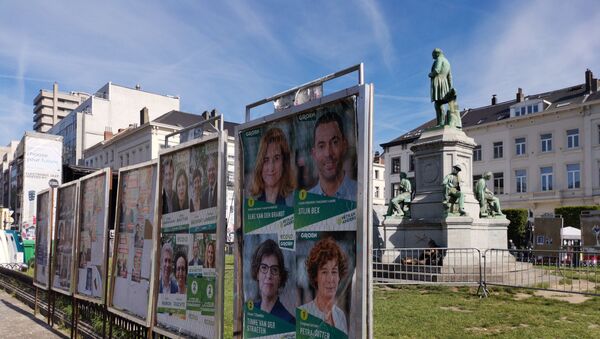Matonge is one of Brussels’ poorest neighborhoods. It’s also one of the most exotic ones. You can get yourself a tailor-made suit here, buy traditional African souvenirs or rare tropical fruit and vegetables. But, as locals told us, there's also a dark side to the neighborhood: if you’re in the wrong place in the wrong time – you could end up robbed or beaten. Named after an area in Kinshasa, Matonge is populated mostly by people with African background and is often called "Little Zaire".
— Denis Bolotsky (@BolotskySputnik) 25 мая 2019 г.
Sometimes there are so many political ads in the windows, that you can't see what's inside the shop. But if you ask store owners whether they know any of the candidates or their political platform – you’d probably get a negative answer.
"I haven’t met any of them personally" – says Ali – a store owner, who moved to Belgium from Bangladesh 7 years ago. The man names a number of problems on his block that he would like to be solved – from removing the traffic camera around the corner, which, as he says, takes photos of his customers’ cars and sends them fines without any warning, to street crime, with thugs occasionally attacking just about anyone on the block – from business owners to tourists.
"The situation here is very difficult; to do business here is difficult. When someone is stuck in the traffic and they’re calling the police – they don’t come to see what’s happening, because they know that the traffic is blocked."
Belgium is divided greatly along the lines of ethnic and cultural diversity. While the majority of politicians trying to get votes in Matonge are French-speaking Walloon social democrats, Christian democrats or liberals, in other areas of the country, such as the provinces of Flemish Brabant of Limburg, there more Flemish conservative and nationalist candidates.
— Denis Bolotsky (@BolotskySputnik) 25 мая 2019 г.
Unlike other EU member states, Belgium with its 21 MEPs will not get additional European Parliament seats after Brexit.
On Sunday Belgian voters will also elect 150 members of the Chamber of Representatives, 124 members of the Flemish Parliament and 75 members of Walloon Parliament.



